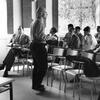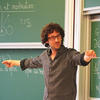You are here
Vincent Lafforgue Wins the Breakthrough Prize in Mathematics

The breakthrough prizes were founded in 2012 and are sponsored by Sergey Brin (Google), Priscilla Chan and Mark Zuckerberg (Facebook), Ma Huateng (Tencent), Yuri and Julia Milner and Anne Wojcicki (23andMe). They aim to celebrate scientific research and inspire the next generation of scientists. Every year, three prizes reward research in Fundamental Physics, the Life Sciences and Mathematics. This year, the Breakthrough Prize in Mathematics went to the CNRS researcher Vincent Lafforgue, testifying once again to France’s scientific excellence. It is indeed the fifth time over the past six years that a French scientist receives the accolade.
Having ranked first at the ENS1 competitive entrance examination, Vincent Lafforgue completed his PhD in 1999. His thesis, carried out under the supervision of Jean-Benoit Bost , focused on the Baum–Connes conjecture. During his research, he introduced original Banach algebra techniques to solve new cases of the conjuncture. Still in 1999, he joined the CNRS IMJ2 laboratory where he succeeded after several years’ work in demonstrating the conjecture with coefficients for a whole series of new cases, or "hyperbolic groups" in the sense of Gromov.
The mathematician then decided to move on to a new subject. “Trying to solve a difficult problem means failing nine times out of ten. You have to be able to change focus and concentrate on a new topic”—a freedom that the senior researcher says he owes to the CNRS. “A permanent position allows a scientist to enjoy true peace of mind. Our research and projects are difficult and it can take up to ten years before we get significant results. Moreover, we can’t predict what we will find.”
For more than ten years, Vincent Lafforgue dedicated his research to algebraic geometry and especially to the so-called “Langlands program”, a vast series of conjectures in arithmetic. In 2013, his work on global fields of positive characteristics significantly contributed to the program. These achievements earned him the CNRS silver medal in 2015. Meanwhile, he continued his research with Alain Genestier.3 In August last year, he was one of the many French scientists to take the floor at the International Congress of Mathematicians, an event held every four years and during which the prestigious Fields Medal is awarded.
At present, Vincent Lafforgue is looking into operator algebras for quantum mechanics in the hope of finding new materials for green energy. After reading about the ongoing ecological crisis, and in particular its economic aspects, he decided to embark on new research in this field. “Economists say there is global underinvestment in clean energy and ecology: 0.01% of global GDP - while our future depends on it. It convinced me to get started. I want to try and bring my contribution. Let me add, however, that this research is very advanced at the CNRS.” Vincent Lafforgue will receive his prize on November 4 during the 2018 Breakthrough Prize ceremony, aimed at inspiring the next generation of scientists and initiating a dialogue between science and society. “While applied science does not lack support, basic science is very fragile and requires the backing of governments worldwide. Public recognition and understanding of what scientists actually do is essential to secure this support,” Yuri Milner told Bloomberg Technology.
This is why the event seeks to be some sort of “Oscars of Science” ceremony: the laureates are rewarded during a televised celebration bringing together prestigious guests at NASA’s Ames Research Center (Silicon Valley). The founders of the Breakthrough Prize also wish to entice children into science. An idea shared by Vincent Lafforgue who thinks that youngsters should have a right to develop their capabilities and taste for science. “It’s very important to start doing mathematics at a young age. I really enjoyed my maths classes at school, especially mental arithmetic, geometry and arithmetic. Extracurricular activities played an important role in my childhood too. I would read books written by mathematicians for children and teenagers,” he adds.










